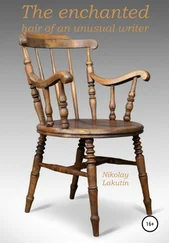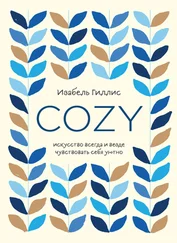“I was at Peterhouse, myself. It was positively stiff at the time with students reading law.”
Coffield barely troubled to conceal his surprise. How-why- would anyone go from Peterhouse to a career in the local police force? St. Just felt it would be pushing rudeness to counter-productivity to explain he had felt his passion for law and order would be better served in investigating crime than in exculpating it as a barrister. And to be a solicitor had struck him as the very height of boredom.
“I gather Sir Adrian was-a frequent customer?”
At this Coffield laughed. It was nearly as unexpected as the smile of his severe little assistant out there in the reception area. Perhaps knowledge of the old university tie had softened him a bit.
“Our best customer. One might think it was in the nature of a game he liked to play, this constant fiddling with his will. He did like to torment his family with it, or at least use it as a stick. But he was, I always thought, deadly serious about this ‘game.’ He was determined that no one who had won his disfavor would be permitted to gain from the sweat of his brow, as he liked to put it. Unfortunately, that left almost no one to leave anything to. At one point-this was probably the first will I made out for him-he’d left the bulk of his estate to some home for wayward girls. Rather as a joke, I think.” He shrugged, palms upward, in a “Who knows?” gesture.
“Personally, I was amazed to learn there was such a thing in this day and age,” Coffield went on. “It was a convent school in London. St. Drudmilla’s or some such, I believe. But he couldn’t be talked out of it. He believed in his heart of hearts-as we all do, I daresay-that he would live forever, so he could put anything he damned well liked in his will and it wouldn’t matter. At the same time, as I say, he was quite serious about it all. Worried, would be a better word. I think it really tormented him that-well, that his family had turned out the way it had. That he had no one he trusted or liked enough to leave it all to. Rather sad, when you think of it.”
But Mr. Coffield didn’t look sad, thought St. Just. Puzzled, yes, but not sad.
“You didn’t like him?” he asked.
“It was neither here nor there whether I did, and after our first encounters I gave up trying. For his part, he was confident I was competent to draw up something airtight and incontestable and that’s all he cared about. But no, I can’t say I did-like him, that is. My father-well, he spoke of him infrequently, but he indicated once that Sir Adrian had greatly changed over the years. That success had changed him, is what I suppose he meant.”
“How did they meet, Sir Adrian and your father?”
“In Paris, he told me. In a café, most likely, while my father was doing the Grand Tour. That would be about ten years after the war, when Sir Adrian was establishing himself as a writer. No doubt hoping to get in with some remnant of the Hemingway/ Fitzgerald crowd. I doubt he had much success at that. Didn’t have a pot to piss in, for one thing, until his marriage, and even then, Sir Adrian was so… competitive, he wasn’t likely to be welcomed by any group of writers, cutthroat as they themselves may have been. My father rather took him under his wing, and may have given him a pound here and there to keep body and soul together. At least Sir Adrian wasn’t entirely ungrateful, we must say that for him. More likely, he saw my father’s potential usefulness. In any event, he maintained the relationship for all the decades that followed, and, of course, became a favored client.”
“I see.” St. Just made a concerted effort not to shift about in the leather chair, which protested like an old saddle with his every movement. “For the moment, let’s go back to your most recent meeting with him. He always visited your offices, did he? You weren’t invited out to the house?”
Again, that brief, harsh laugh. “Tony Blair would have been more welcome. No. It may have been partly that I was regarded more as hired help. But beyond that, I think he liked his little visits here kept secret-until he was willing to announce them to fullest effect himself.”
“Was there any one beneficiary who seemed to be in favor more often than the others?”
“I think Sir Adrian rather regarded Ruthven as a chip off the old block,” Coffield answered obliquely. “For the most part, yes, he had stayed at the top of Sir Adrian’s personal honors list more often than the rest of them. But his last will and testament-his very last-changed all that. The estate was divided equally, this time, among his new wife and his lawful issue, excepting Ruthven-a new wrinkle. The wife gets the use of the house, which is then to pass to George. The staff were well done by, as always. Yes, surprising, what?
Oh, and that secretary chap of his was made literary executor of his most recent manuscript-something about Scotland. The royalties from that were left to his ex-wife. Interesting also, I felt. But it all didn’t matter, in a way. He’d probably have just changed it again, before too long.”
“Given the chance. But… how peculiar. For a start, I didn’t gain the impression he was on the outs with his eldest son.”
“It’s not really peculiar. At least, not by Sir Adrian’s standards, not peculiar at all. He’d done similar things before. The last will but one, his daughter was cut out completely; I forget why. Something about Middle Eastern foie gras . Before that, George, when he got involved with a rock group or something of which I gather Sir Adrian disapproved. It was all quite feudal. They none of them knew at any given time who was in, who was out of favor. And somewhat akin to Russian roulette, as it turns out, for Sir Adrian himself.”
Ignoring the question behind Coffield’s last words, St. Just said, “He sounds like the kind of man who’d enjoy making a tontine .”
Coffield cocked a brow in amused appreciation.
“Quite illegal these days, you know. It creates too much temptation for people to bump each other off in the hope of being the only remaining beneficiary. Sir Adrian sailed very near the wind on that score on several occasions, or tried to. It quite suited his proclivity for promoting fierce competition amongst his heirs. Fortunately, I was able to talk him out of it. As I say, tontine schemes are illegal in this country, although I understand they survive in some limited way in France.”
“Could any of them have gotten hold of a copy of the will?”
“Highly doubtful. Sir Adrian was most particular about that. Of course, I tried to give him a copy in the usual way. He declared he would just burn it like he’d burned all the rest-he didn’t want it lying about for prying eyes to see. No, the will was lodged with us here, on the premises, with a further copy kept at the bank for safekeeping. “
“It’s not impossible someone could have broken in here to have a look?”
Coffield’s reply was chilly. “It’s not completely without the realm of possibility, of course, but I would say it’s highly unlikely. Extremely. We’ve never had a burglary of any kind.”
“I meant no criticism of your care in handling your clients’ affairs,” said St. Just evenly. “But you must see that this will, especially the… peculiar… way Sir Adrian messed about with it, may be vital to solving the case. This marriage, for example-”
“I was the last to know about that, apart from his family. He slipped off to Gretna Green, mind made up on that score. I doubt I could have talked him out of it, even had I been given the opportunity to try.”
“And now, weeks later, his new wife inherits a large share of- What sort of amount are we talking about, Mr. Coffield?” He didn’t expect an answer, and so was all the more surprised when Coffield said:
Читать дальше
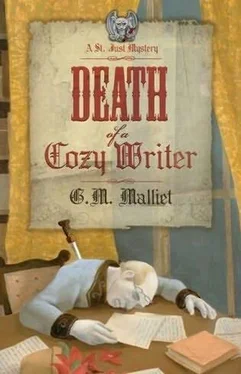
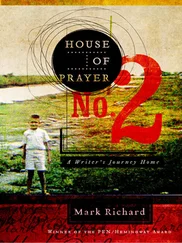


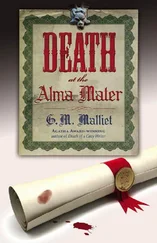


![Изабель Гиллис - Cozy. Искусство всегда и везде чувствовать себя уютно [litres]](/books/406910/izabel-gillis-cozy-iskusstvo-vsegda-i-vezde-chuvs-thumb.webp)
